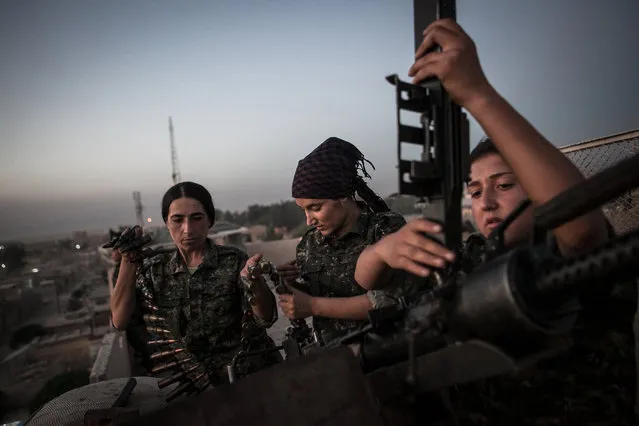
Captain Ronahi Anduk, 34, left, Gian Dirik, center, and Dirsim Judi, 18, right, work on the Dushka weapon at the YPJ center in the town of Til Colture, on the border of Syria and Kurdistan on Aug. 9, 2014. The YPJ, pronounced “Ya-Pa-Jah” in Kurdish, founded in 2011, is a vigilante non-government military unit formed by the Kurdish citizens of Roshava, a province of Kurd citizens in Syria, with the mission of protecting the citizens of of the region. The YPJ's creed is protect all people, regardless of race and religion, which has made them one of the leading forces battling IS in Syria and Kurdistan, while also aiding the Peshmerga and the PKK. The YPJ and YPG (men's unit) is responsible for evacuating thousands of Yiziti refugees who were stranded in the mountains of Shingel without food or water for over a week. There are about 7,000 – 8,000 women fighteres in the YPJ. (Photo by Erin Trieb/NBC News)
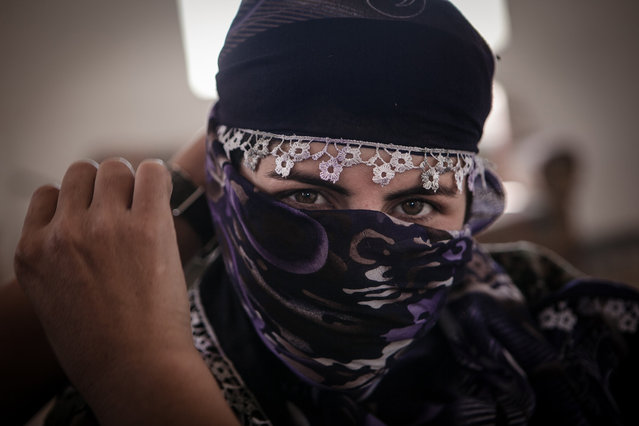
YPJ soldier Narlene, 20, puts a scarf around her face at an abandoned Iraqi Army Post on the outskirts of Raabia, Syria, August 9, 2014. On the desolate Syrian-Kurdistan border live many YPG / YPJ soldiers, who are staked out at makeshift posts to fend of IS attacks and protect the border. (Photo by Erin Trieb/NBC News)
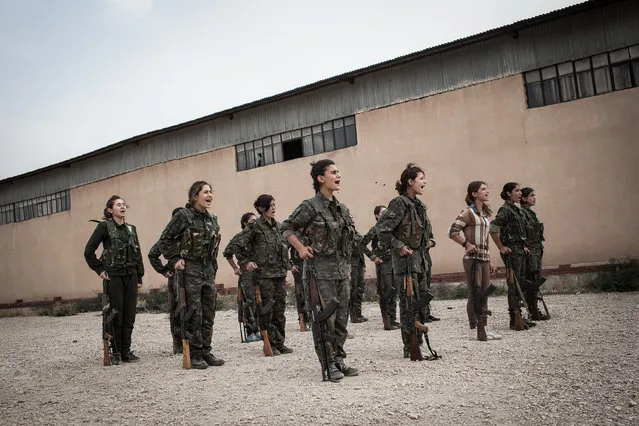
Young YPJ recruits participate in drills at dawn near Derek City, Syria. The YPJ schedule is demanding and requires discipline – new soldiers in training get about 6 hours of sleep a night and wake up at 4 AM; their day consists of a full schedule of drills and classroom lessons. Before joining the YPJ many of the girls had never participated in physical activity or sports before. (Photo by Erin Trieb/NBC News)
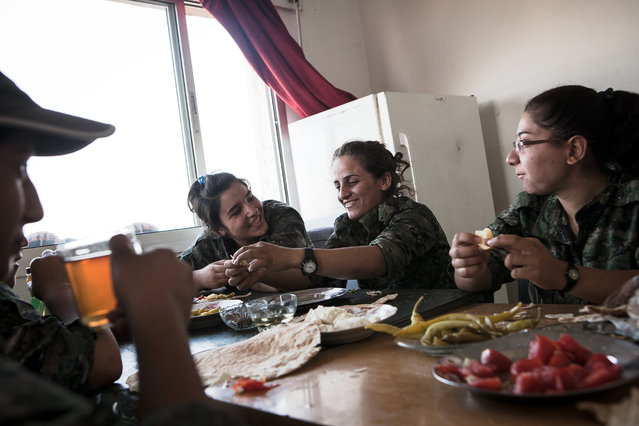
YPJ soldiers eat a breakfast of peppers, tomatoes, cheese, flatbread and tea at their post near the Syrian-Kurdistan border in Til Kocer, Syria on August 9, 2014. YPJ meals are often modest since most of their supplies, including food, are donated from local community members. (Photo by Erin Trieb/NBC News)
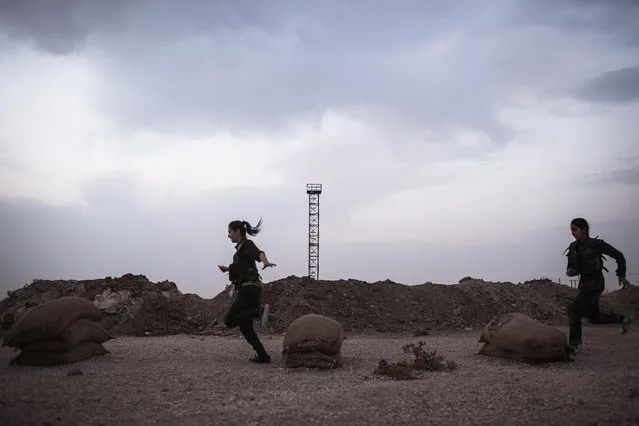
Young YPJ recruits participate in exercises and drills at dawn, near Derek City, Syria. The YPJ schedule is demanding and requires discipline – new soldiers in training get about 6 hours of sleep a night and wake up at 4 AM; their day consists of a full schedule of drills and classroom lessons. Before joining the YPJ many of the girls had never participated in physical activity or sports before. (Photo by Erin Trieb/NBC News)
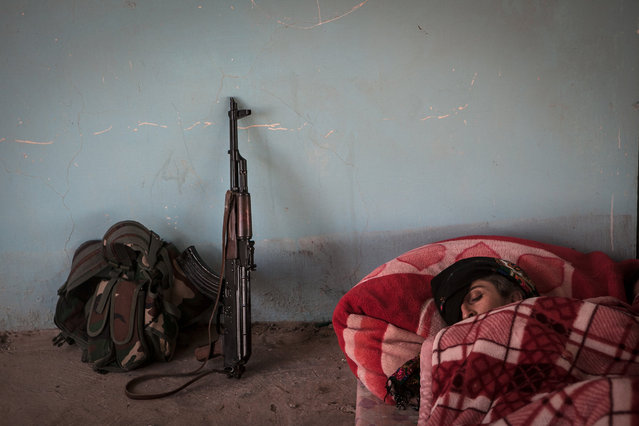
YPJ soldier Shavin Bachouk, sleeps early in the morning at an abandoned Iraqi Army Post on the outskirts of Raabia, Syria, August 9, 2014. On the desolate Syrian-Kurdistan border live many YPG / YPJ soldiers, who are staked out at makeshift posts to fend of IS attacks and protect the border. (Photo by Erin Trieb/NBC News)
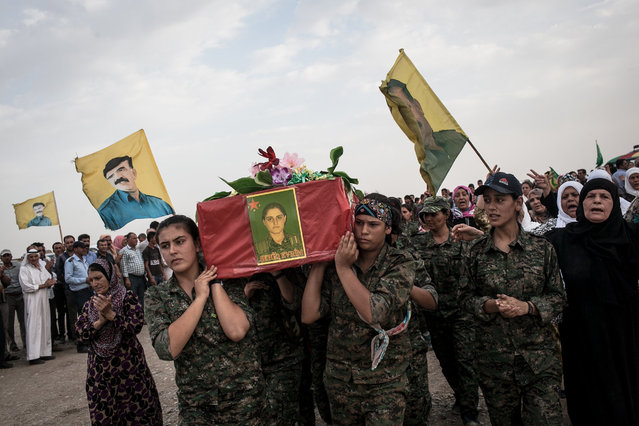
At a funeral procession YPJ soldiers carry the casket of fellow female soldier, Evrim, who died in combat while fighting IS; in Derek City, Roshava, Syria on August 18, 2014. Rojava experiences several funerals a month due to the recent intense fighting conditions with IS in the region – about 24 YPG / YPJ soldiers were buried during the month of August in the cememtery pictured here. Family members consider it an enormous honor when their children are killed in combat, calling the soldiers “Sehid” which means “marytr” in Kurdish. A popular saying among the YPG / YPJ community is "Sehid na merin" which means “the martyr will never die”. (Photo by Erin Trieb/NBC News)
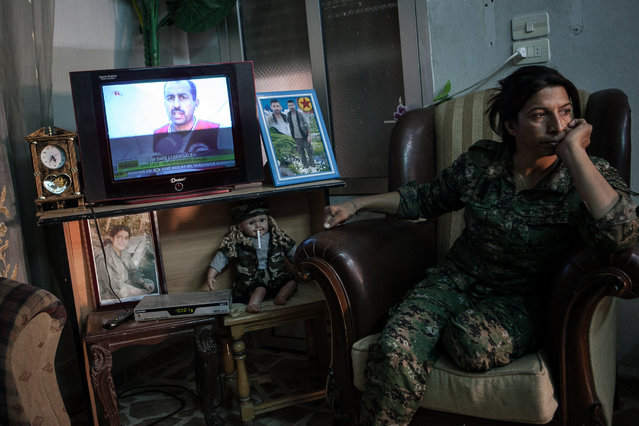
YPJ soldier Nuhad Kocer, 29, sits near the television; on the left sits a doll dressed in a YPJ uniform with a cigarette in its mouth, nicknamed “Azadi”, at a YPJ military base in Til Kocer, Syria, on August 9, 2014. “Azadi the doll” was named after YPJ soldier Azadi Ristem, pictured in the photo frame on the left, who was killed by sniper fire by Jibhad L'Nasra, a faction group of Al Quaeda. (Photo by Erin Trieb/NBC News)
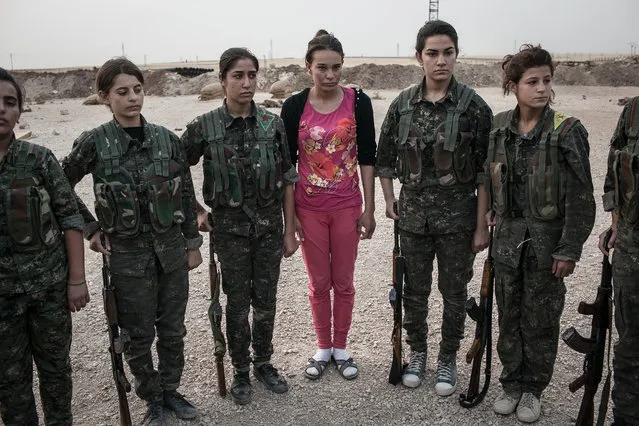
A young YPJ recruit (in pink) arrives to the training base for her first day in training near Derek City, Syria. The YPJ schedule is demanding and requires discipline – new soldiers in training get about 6 hours of sleep a night and wake up at 4 AM to begin exercising; afterwards, their day consists of a full schedule of drills and classroom lessons. Before joining the YPJ many of the girls had never participated in physical activity or sports before. (Photo by Erin Trieb/NBC News)
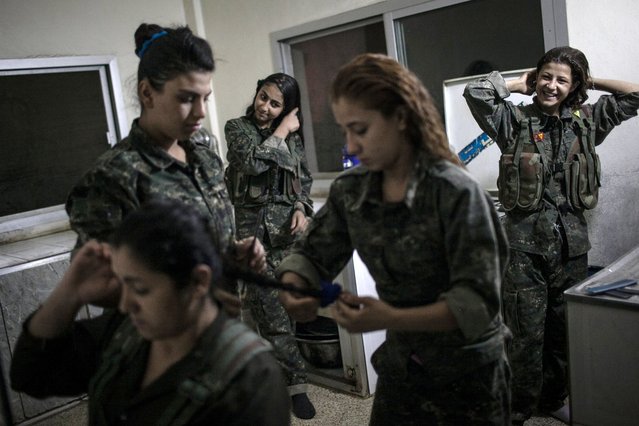
Young YPJ recruits Fix their hair at 4:30 AM before participating in training exercises and drills, near Derek City, Syria. The YPJ schedule is demanding and requires discipline – new soldiers in training get about 6 hours of sleep a night and wake up at 4 AM; their day consists of a full schedule of drills and classroom lessons. Before joining the YPJ many of the girls had never participated in physical activity or sports before. (Photo by Erin Trieb/NBC News)
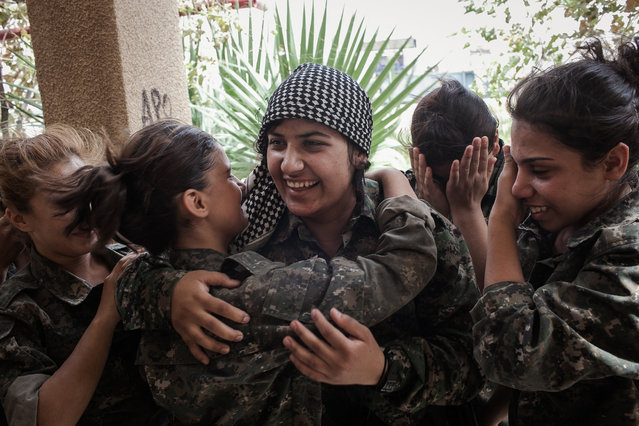
Young YPJ recruits cry and embrace a fellow soldier who they thought had been sent to the frontline and were surprised to see her return, near Derek City, Syria. The YPJ schedule is demanding and requires discipline – new soldiers in training get about 6 hours of sleep a night and wake up at 4 AM to begin exercising; afterwards, their day consists of a full schedule of drills and classroom lessons. Before joining the YPJ many of the girls had never participated in physical activity or sports before. (Photo by Erin Trieb/NBC News)
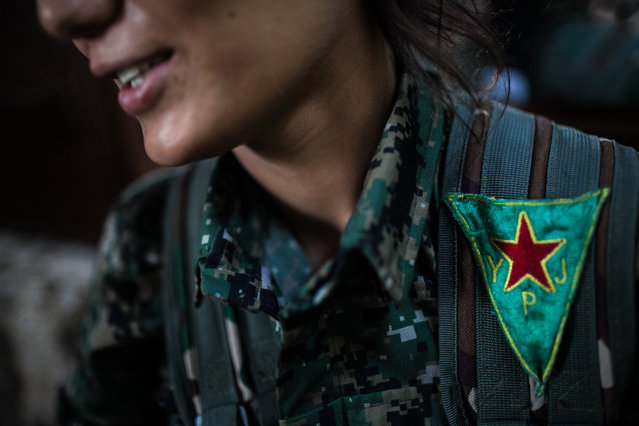
YPJ soldier, Amara, wears a red, yellow and green patch, the official flag of the YPJ, on her uniform near Girke Lege, Roshava, Syria on August 18, 2014. The colors of red, yellow and green have become Rojava's designated colors of patriotism – scarves, flags and posters are popular among the citizens who have embraced the YPJ as their official miliary. (Photo by Erin Trieb/NBC News)
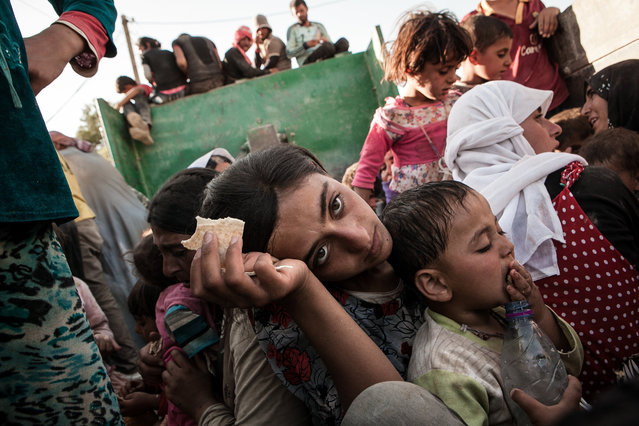
Yazidian refugee Sohare Salam, 13, eats a piece of bread, the first food she has had in several days, in the back of a truck after being rescued from the mountains of Sinjar and arriving to safety in Til Kocer, Syria, photographed on August 9, 2014. Sohare and her family were stranded in the Sinjar Mountains after IS militants attacked her village, killing thousands and enslaving hundreds of women and children. The YPG and YPJ played a major role in helping liberate the citizens of Sinjar, rescuing them from the mountain top while simultaneously fighting IS in Northwestern Kurdistan. (Photo by Erin Trieb/NBC News)
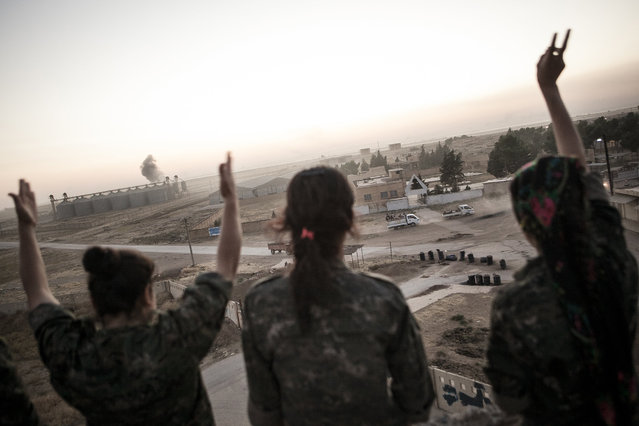
YPJ soldiers cheer and hold up the peace sign at the sight of Sinjar refugees in trucks being rescued and delivered to safety in Til Kocer, Syria, August 9, 2014. On the desolate Syrian-Kurdistan border live many YPG / YPJ soldiers, who are staked out at makeshift posts to fend of IS attacks and protect the border. (Photo by Erin Trieb/NBC News)
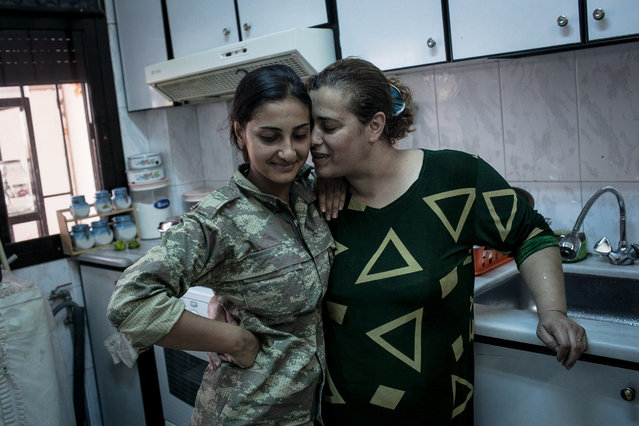
Jin, left, a YPJ soldier, shares an intimate moment with her mother, Amina, at their home in Girke Lege, Rojava, Syria on August 18, 2014. Even though she lives at a YPJ base near by her home, Jin had not seen her mother in over a month because of the highly demanding YPJ military schedule. (Photo by Erin Trieb/NBC News)
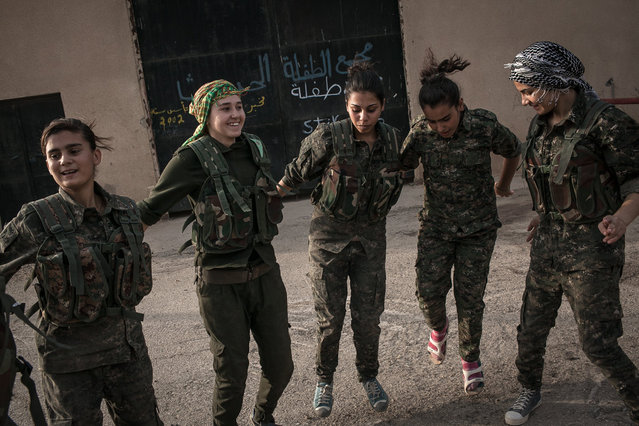
Young YPJ recruits take a break by dancing and singing traditional YPJ songs at dawn, near Derek City, Syria. The YPJ schedule is demanding and requires discipline - new soldiers in training get about 6 hours of sleep a night and wake up at 4 AM; their day consists of a full schedule of drills and classroom lessons. Before joining the YPJ many of the girls had never participated in physical activity or sports before. (Photo by Erin Trieb/NBC News)
10 Sep 2014 12:01:00,
post received
0 comments
